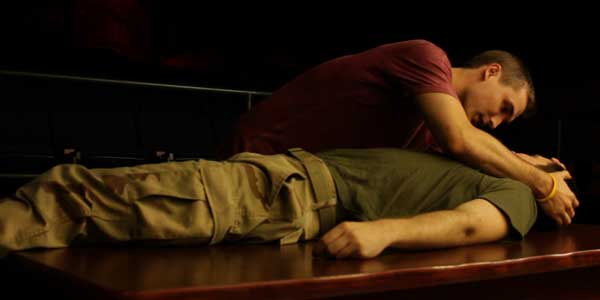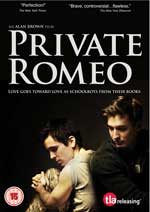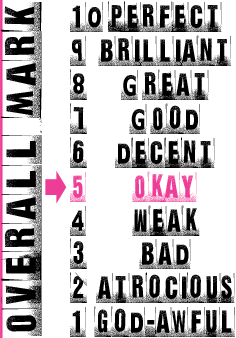
Director: Alan Brown
Running Time: 94 mins
Certificate: 15
Release Date: April 23rd, 2012

Romeo & Juliet but gone gay in a military academy. That’s what Private Romeo is and it’s just as intriguing yet problematic as that sounds. A group of lads at a military school are studying Shakespeare’s great romantic tragedy. However they don’t leave the Bard’s words behind when the bell rings, with Romeo & Juliet taking over their lives as two of the boys develop a forbidden love. However as rivalries grow this newfound love could develop into full blown tragedy.
It’s certainly an interesting idea, especially as the film keeps Shakespeare’s verse, but there are some major problems. Writer/director Alan Brown has chopped Shakespeare’s text down, added some modern music and social media touches and turned Juliet into a boy, but it never quite feels as if he makes the whole concept work. The film is great in fits and starts, with certain scenes working magnificently. The best bits are when the star crossed lovers are alone and Shakespeare’s passionate text mixes with more modern ideas about hidden gay romance to create some intense and absorbing scenes. However when it expands out to other characters it doesn’t always work.
By not changing any of the text – they don’t even bother to change Juliet to Julian, for example – it makes things rather unclear. There’s a rivalry between two groups of boys, but exactly why they hate each other is never properly explained. Indeed a lot about the military academy doesn’t make sense, such as why it only has eight students and no staff. Apparently the rest of the students have gone off somewhere for a few days, but it’s never really made clear what’s going on. If the set-up is going to make complete sense, the movie needs to infer a lot outside the original text, and it never quite manages that.
It’s a very good idea though and it’s difficult not to think it could have been made to work better than it does with a bit more thought, tweaking and perhaps by not being so afraid to add to or alter the original text. It’s not just in fitting the plot to a gay romance in a military school that feels a tad stretched, it’s also in how the Bard’s characters are played out. For example, in the original play Juliet’s nurse is a comic character, but when she’s transplanted onto a teenage boy she just becomes frustrating (although it tough to know whether that’s the fault of the concept or the acting). Likewise while the rivalries between the characters are clear in the play, it becomes murky here when removed from Verona and two feuding families. Clever conceptual Shakespeare often finds something new to base the tension around, but that doesn’t really work here.
The bits that don’t work are a great shame, because as mentioned some of it is great. When talking about secret love, it’s almost as if Shakespeare was deliberately writing about closeted gay romances and the central love story itself works extremely well – it’s just all the stuff around it that doesn’t quite work and which feels unclear and occasionally illogical. Private Romeo does try to cover this up by getting its buff young cast to wander round wearing only towels for as much of the running time as humanly possible, but this only helps up to a point!
If you want to see Shakespeare gone gay, take a look at the musical Were The World Mine, which dispenses with the language it knows won’t work but keeps the ideas of A Midsummer Night’s Dream to tell a more modern story. It shows how this sort of thing can be done well and may be a good place to get tips for the next person who wants to do gay Romeo & Juliet, as it’s definitely a good idea.
Overall Verdict: A modern, gay Romeo & Juliet is a fascinating idea and the love story at the play’s core definitely lends itself to the idea, but when Private Romeo tries to fit the rest of the plot into a military academy it has difficulties.
Reviewer: Tim Isaac





Leave a Reply (if comment does not appear immediately, it may have been held for moderation)